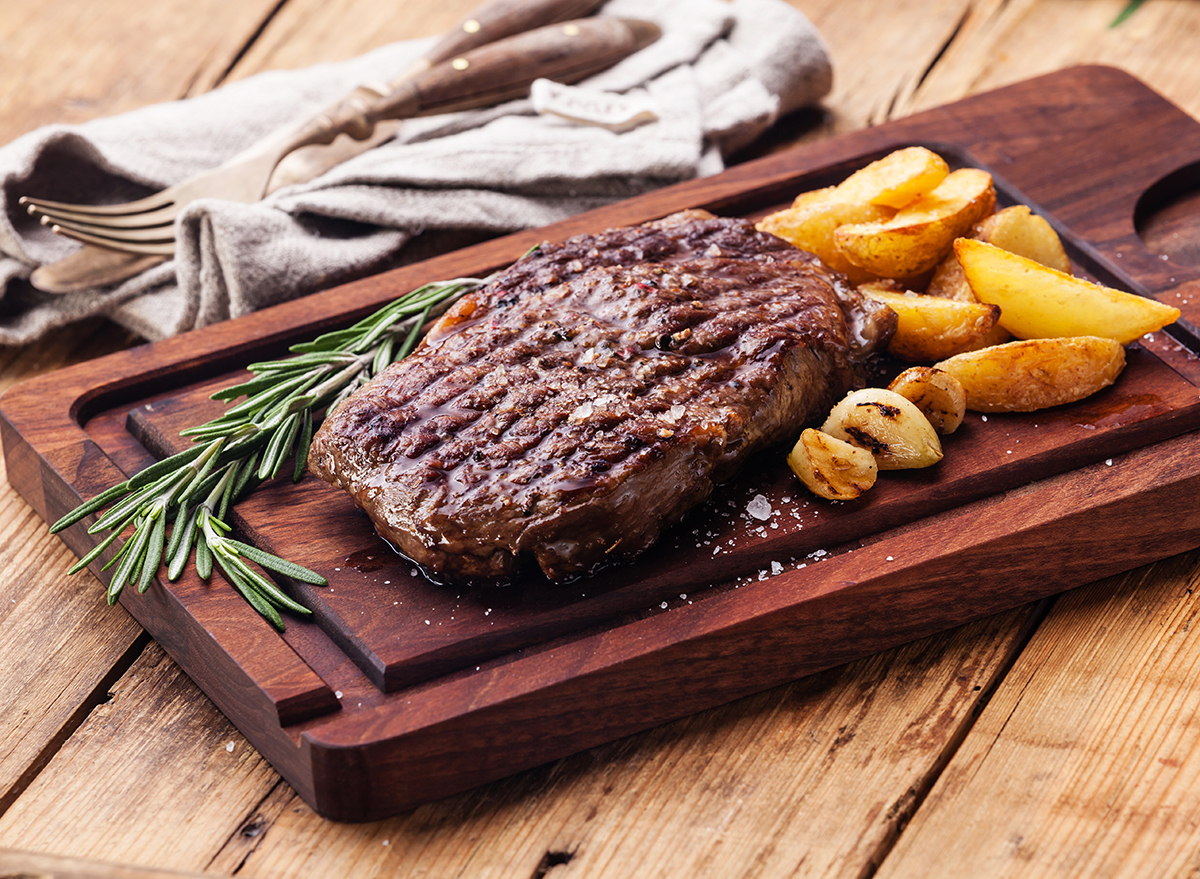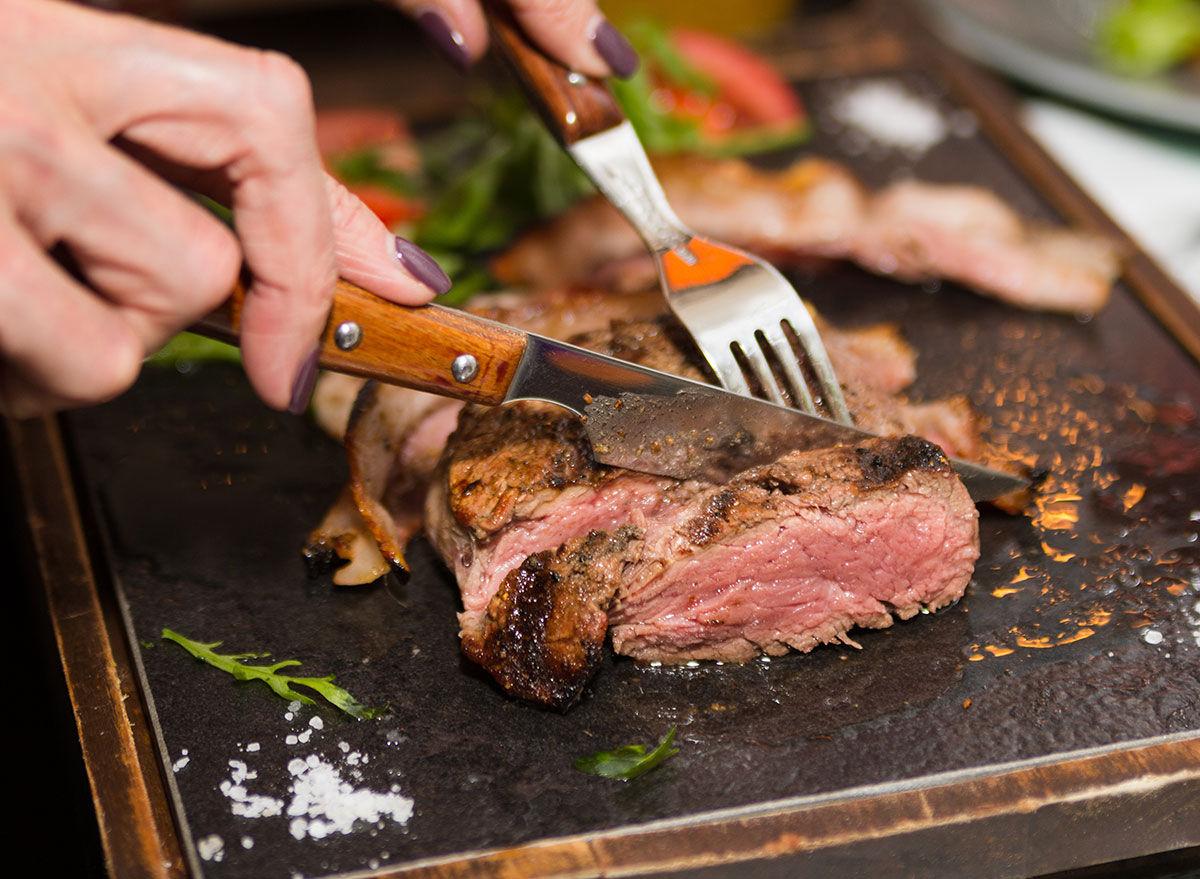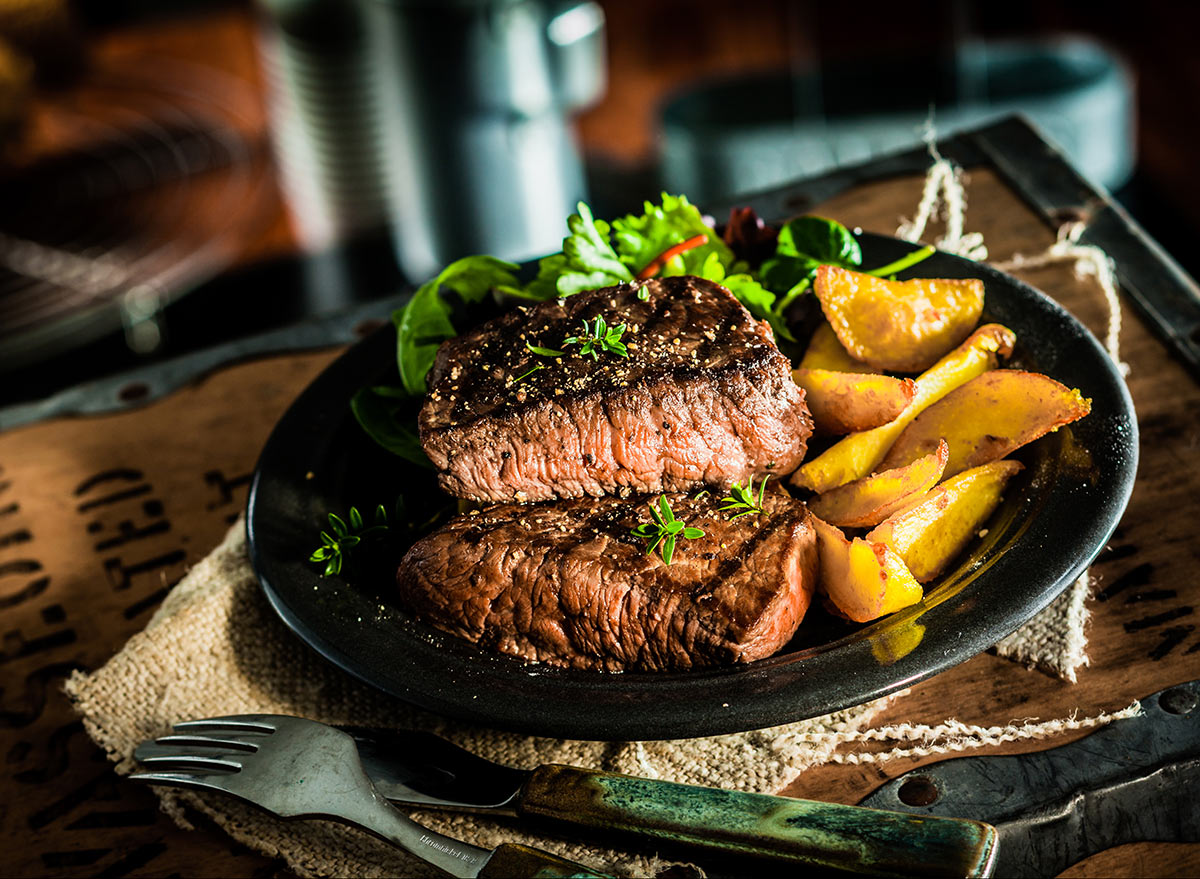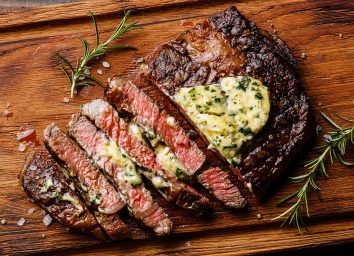Side Effects of Giving up Red Meat, According to Science
You'll be hard-pressed to find a topic more hotly debated in the nutrition world than red meat. While some insist it's downright dangerous to consume, others maintain that it poses no harm, and can in fact be part of a healthy diet (in moderation, of course). While much of the scientific evidence may be contradictory, one thing is for sure: you can expect some side effects if you give up red meat.
In 2015, the World Health Organization classified red meat as a possible carcinogen, which means that it may potentially cause cancer. Studies have shown that red meat may raise your risk for colorectal cancer, breast cancer, diabetes, kidney failure, and other health problems. What's more, a 2012 Harvard study in the Archives of Internal Medicine discovered that eating more red meat can actually shorten your life. Participants who ate the most red meat tended to weigh more, exercise less, smoke and drink more, and die younger (specifically, more often due to cardiovascular disease and cancer). Even when the researchers compensated for certain unhealthy lifestyle factors that may have come into play, meat was still linked to premature mortality. Other researchers, meanwhile, have indicated that evidence of red meat's link to health risks is weak.
Clearly, it's a complicated subject. According to Lauren Minchen, MPH, RDN, CDN, and nutrition consultant for the AI-driven visual diet diary app Freshbit, the impact that quitting red meat has on your health will depend on the type and how much you were eating.
"If you are giving up fattier forms of red meat in the form of greasy burgers and buttery, fatty steaks, you will potentially experience some health benefits from reducing your saturated fat and caloric intake," she explains. "If you typically consume lean or grass-fed forms of red meat and in proper portions at mealtime, the drawbacks you may experience would potentially outweigh the benefits."
With that in mind, here are some of the side effects you can expect—both good and bad. After, be sure to check out the 100 Unhealthiest Foods on the Planet.
You might shed some pounds.

Red meat is pretty calorie-dense—a 6-ounce portion of ribeye contains 270 calories, which is a lot compared to one serving of black beans (1/2 cup) at just about 113 calories. Not to mention, the black beans have no saturated fat, while the steak has a whopping 6 grams.
If you were eating red meat on the regular before, that can definitely add up. That's why Minchen says you may have an easier time losing weight, or at the very least, maintaining it.
Both a 2006 and a 2011 study found that people who consumed higher amounts of red meat were more likely to be overweight or obese than those who ate it less often or not at all. That said, whether or not you lose weight after giving up red meat can depend heavily on what foods you're replacing it with.
Here's What Happens to Your Body When You Cut Red Meat From Your Diet.
Your heart health will improve.

According to a 2014 study, red meat has been found to contain carnitine, a protein building block that triggers the release of trimethylamine-N-oxide (TMAO). And TMAO can accelerate the thickening and hardening of artery walls, thus causing heart problems. A 2019 study published in the European Heart Journal revealed that people who ate red meat had three times more TMAO in their blood than when they were only eating white meat or non-meat protein sources.
Not to mention, saturated fat has been linked to higher levels of LDL (bad) cholesterol, which increases your risk of heart disease by causing plaque buildup in the artery walls—and red meat is high in saturated fat. So, giving it up could improve your cholesterol, thus helping to protect your heart. In fact, a 2017 study published in Nutrition Reviews revealed that plant-based diets can reduce LDL cholesterol by 15 to 30%.
"You also may make room for healthier fats, like omega-3's from wild fish and monounsaturated fats from nuts and seeds, that reduce cholesterol and boost heart health," says Minchen.
You'll have lower levels of inflammation.

A 2014 study published in the journal Nutrition Research found that vegetarians have less inflammation in their bodies than meat-eaters. Seeing as inflammation has been linked to many chronic diseases, that's already a major perk to nixing red meat from your diet. But according to Minchen, that can also have a positive impact on your digestive system as well.
"Eliminating heavy fats from red meat alone may improve digestion by reducing inflammation and urgency, and it may help leave room for more fibrous foods to promote healthy elimination," she says.
You may experience a protein deficiency.

One thing you'll need to keep an eye on after ditching the red meat is how much protein you're getting.
"Depending on how much meat you were consuming, cutting out red meat without replacing it with another complete protein source may lead to insufficient protein intake," says Minchen. "Track your protein intake in an app like Freshbit to make sure you are achieving the desired amount on a daily basis."
A protein deficiency can cause a slew of concerning side effects such as a weakened immune system, muscle mass loss, edema, trouble regulating your appetite, dry skin, and weak hair and nails. So, it's important to replace red meat with other high-protein foods, like poultry, fish, beans, legumes, tofu, eggs, yogurt, nuts, and seeds.
Your immune system may take a blow.

Red meat is chock full of important vitamins and minerals—all of which play a key role in your body's ability to fight off harmful infections. For instance, Minchen notes that red meat provides a form of iron that is absorbed better than plant-based sources, which helps to ward off anemia. So, what happens if you're not replacing the red meat with other foods that are high in those nutrients?
"When one's protein, zinc, selenium, B vitamin, and iron intake is insufficient for an extended period of time, the immune system suffers," says Minchen.
In particular, Minchen says it's crucial to keep an eye on your intake of zinc and selenium, which work together to support immune health.
Fortunately, it's possible to make up for this loss of nutrients by taking a supplement, and/or by incorporating other vitamin- and mineral-rich foods. For instance, beans and lentils, salmon, nuts, seeds, shellfish, tofu, whole grains, and certain cheeses all contain many of the essential minerals your body needs.
Here are 6 Signs of an Iron Deficiency You Should Never Ignore.
Your bones may get stronger.

Osteoporosis, a disease that causes bones to weaken, is surprisingly common—affecting some 10 million Americans—and it can put you at a much higher risk of breaking or fracturing your bones. A series of studies conducted by Cornell-China-Oxford Project on Nutrition found that eating less meat can actually reduce your risk of osteoporosis, however. Specifically, eating less meat reduces your risk of losing bone density, since animal protein tends to leach more calcium from the bones than is consumed. Diets high in animal protein were linked to high excretions of calcium through the urine, whereas plant-based diets had the opposite effect.
It's worth noting that these findings applied to all meat, not just red kinds—so in order to reap these bone-strengthening benefits, you'd ideally need to replace red meat with plant-based proteins rather than other kinds of meat.
Get even more healthy tips straight to your inbox by signing up for our newsletter!









